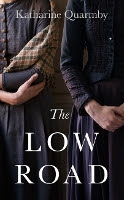The book (I'm not sure whether to refer to it as story) begins on the battlefields of WW1 where a soldier, John, lies injured, with his thoughts drifting back to childhood, to his first meeting with his lover, to times since then spent with her. Three years later, he's home, reunited with Helena, trying to pick up the life that was interrupted by war, but still carrying the physical and mental scars of battle, and still searching for that place and time when he felt 'held' and surrounded by love.
At this point it feels like the story might follow their life - but it doesn't. There's no linear plot, not even an overall story arc or a darting backwards and forwards to reveal something buried in the past. Instead the book is comprised of vignettes capturing a moment in time, highlighting important moments in the lives of John's family over four generations,with a linking theme of their search for that feeling of love and safety.
Overall I found this an odd book, maybe because I was expecting something more straightforward. The writing is beautiful and poetic, but the flitting from one generation to the next is confusing at first, and takes some getting used to. Having finished the book and being able to see it as a whole, I feel I can appreciate it more, and would like to reread it.


























